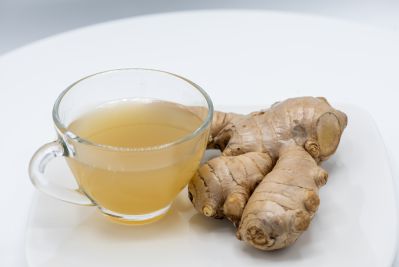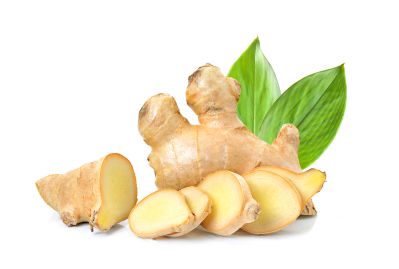Ginger is basically the root of Zingiber officinale Roscoe plant. It is commonly used as spice, but it has also been used in the field of folk medicines for centuries, where it had used to treat several diseases, inflammation, infections and facilitates healing. It is also well known for its anti-mutagenic effect. The nutritional composition of ginger makes it one of the most important food stuffs worldwide.
Nutritional profile of ginger
- Ginger contains very low amount of carbohydrates, fibre, proteins and fats both saturated and unsaturated fatty acid within it
- It has high moisture content
- It contains some important trace element like sodium, potassium, magnesium and too some extent of calcium and iron
- It also contains Vitamin C and Vitamin B6
- It contains some chemical constituents which are known as gingerol, shogaol, citral, zingiber and zingerone. Among which gingerol and shogaol are the most effective component of ginger responsible for enhancing its health significance and plays several important roles in body
- It also contains some protease enzymes that promotes digestion
Health benefits
Role on relieving nausea
- It has a role in preventing nausea. The gingerol and shogaol component of ginger are the most active biological compound responsible for enhancing stomach emptying which is related with reducing nausea
- It helps to stimulate the release of blood pressure regulating hormone within body hence help to calm the body and decreases nausea
- It is beneficial to use ginger to prevent morning sickness in pregnancy, mountain sickness, sea sickness and helps to prevent nausea after surgery

Role on preventing cold or flu
- It has been traditionally used for preventing the consequences of colds and flu as it helps to reduce the susceptibility of infection
- It also helps to protect the respiratory system and plays significant role in preventing the growth, multiplication and replication of those viruses which are responsible for respiratory infections

Role on regulating blood sugar
- The shogaol and gingerol contents of ginger are responsible for enhancing the sensitivity of insulin and helps to reduce blood sugar level and related consequences of diabetes
- It mainly helps to reduce fasting blood sugar level. It has estimated that consumption of 2g of ginger powder may reduce the fasting blood sugar level and it is also related with reducing the risk of developing type 2 diabetes
- It also improves the symptoms of glycosylated haemoglobin and helps to reduce the concentration of blood sugar significantly (about 10%) within a specific period of time (about 10 to 12 weeks)

Role on cardiovascular disease
- Ginger is associated with reducing the concentration of LDL, VLDL and triglyceride within body which are considered as the principle factor of developing atherosclerosis and ischemic heart disease
- It also helps to increase the HDL level in body. HDL helps to remove LDL from blood and hence reduces the blood LDL concentration that decreases the risk of developing atherosclerosis
- It has seen that ginger is related with decreasing Apo B to Apo A-1 ratio. This ratio indicates the balance between the concentration of bad cholesterol and good cholesterol. Having a higher ratio indicates higher risk of cardiovascular diseases. As ginger helps to lower this respective ratio hence it may be used as a potential cardio protective food substance
Role on digestion
- The enzyme present in ginger is responsible for enhancing the digestive responsiveness of body and helps in easy digestion of food
- It helps to increase the catalytic activity of trypsin (protein splitting enzyme) and pancreatic lipase (fat splitting enzyme) within body
- It also helps to reduce the risk of gas production within gastrointestinal tract during digestion hence helps to reduce flatulence and gastrointestinal discomfort
- It is also related with increasing peristalsis and promotes bowel health with reducing the risk of constipation
Role on nervous system

- Gingerol of ginger is responsible for preventing any kind of oxidative stress and inflammation occurred in brain
- It is also associated with increasing the functionality of brain and helps to reduce age related decline in cognitive abilities and brain functions
- It has seen that individual who consumes ginger every day has comparatively better memory than those who does not consume ginger
- It also helps to prevent the consequences of Alzheimer’s disease
Role on obesity
- Ginger is associated with boosting up metabolism. It is beneficial to consume ginger water in empty stomach as it increases the catabolic rate and helps to reduce body weight
- As mentioned above it helps to regulate the LDL and HDL ratio of body that is an important feature of reducing fat deposition within body and preventing obesity
Role on hydrating the body
- Ginger helps to hydrate the body. Staying hydrated is the most significant way of becoming healthy as it helps to flush out harmful toxins from body
- Individual who does not consume enough water daily can start their day with ginger water that may help to hydrate their body adequately

Role on testosterone hormone

- Recent studies and researches have shown that ginger helps to increase the secretion of testosterone hormone in men and facilitates reproduction (Banihani, 2018)
- It helps to increase the blood supply, production of LH hormone and cholesterol level in testes and reduces the oxidative damage of the testes results in proper testosterone secretion
Application of ginger
- Ginger contains two most effective biologically active compounds, shogaol and gingerol. Shogaol is abundantly present in dried ginger whereas, gingerol is found abundantly in raw ginger, both of which have great importance in preventing inflammation and pain. Hence, it can be used to treat joint related inflammation and swelling. It also helps to reduce the pain of menstrual cycle and exercise induced muscle pain
- The shogaol component of ginger acts as antioxidant. It helps to reduce the formation of reactive oxygen species and free radicals and leads to decreasing oxidative damages of body. Hence, ginger may be used as a remedial action for preventing cancers as it helps to decrease oxidative stress
- Recent researches have shown that ginger can be used to enhance the quality of processed and packaged foods. As it has seen that the transparent film of cellulose can be synthesised from ginger nanofiber, which can be applied on the surface of the food stuffs as bio-coating that helps to protect the foods from microbial contamination (Abral et al, 2020)
- Ginger is widely used in cooking as a spice
- It has also been extensively utilised in medicinal field to treat various diseases such as diabetes, cardiac disease, cancers, inflammation, infections, obesity and Alzheimer’s disease
- Several researches have shown that ginger oil has significant role to enhance the shelf life of any food substances (especially fats, oils and fat rich food stuffs) as it helps to prevent rancidity. Hence ginger oil may be used in marinating foods (Jakribettu et al., 2016)

Generally dietary consideration of consuming ginger
- It is not beneficial to consume excessive ginger as it may develop several complications like diarrhoea, stomach upset, abdominal discomfort, arrhythmia, heart burn, dermatitis and throat irritation
- Dried ginger, raw ginger root and ginger extract can be consumed as an effective homemade remedy to treat nausea, digestive disorders and other vital health issues

Source:
Abral, H., Ariksa, J., Mahardika, M., Handayani, D., Aminah, I., Sandrawati, N., Pratama, A.B., Fajri, N., Sapuan, S.M. and Ilyas, R.A., 2020. Transparent and antimicrobial cellulose film from ginger nanofiber. Food Hydrocolloids, 98, p.105266.
Al-Awwadi, N.A.J., 2017. Potential health benefits and scientific review of ginger. Journal of Pharmacognosy and Phytotherapy, 9(7), pp.111-116.
Banihani, S.A., 2018. Ginger and testosterone. Biomolecules, 8(4), p.119.
Choi, J.G., Kim, S.Y., Jeong, M. and Oh, M.S., 2018. Pharmacotherapeutic potential of ginger and its compounds in age-related neurological disorders. Pharmacology & Therapeutics, 182, pp.56-69.
Jakribettu, R.P., Boloor, R., Bhat, H.P., Thaliath, A., Haniadka, R., Rai, M.P., George, T. and Baliga, M.S., 2016. Ginger (Zingiber officinale Rosc.) Oils. In Essential Oils in Food Preservation, Flavor and Safety (pp. 447-454). Academic Press.
Mao, Q.Q., Xu, X.Y., Cao, S.Y., Gan, R.Y., Corke, H. and Li, H.B., 2019. Bioactive compounds and bioactivities of ginger (Zingiber officinale Roscoe). Foods, 8(6), p.185.
Shahrajabian, M.H., Wenli, S.U.N. and Cheng, Q., 2019. Pharmacological Uses and Health Benefits of Ginger (Zingiber officinale) in Traditional Asian and Ancient Chinese Medicine, and Modern Practice. Notulae Scientia Biologicae, 11(3), pp.309-319.
Srinivasan, K., 2017. Ginger rhizomes (Zingiber officinale): A spice with multiple health beneficial potentials. PharmaNutrition, 5(1), pp.18-28.



